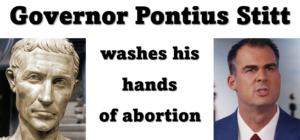Governor Kevin Stitt was recently invited to defend Oklahoma abortion law on Fox News Sunday. He was presented with a great opportunity to explain to a massive audience across the States that abortion is murder, violates God’s law, violates our constitutions, and must be completely abolished. Instead he attempted to defend his limited abortion regulations by citing the desires of the people of Oklahoma whom he represents. The conversation then devolved into an argument over how many people support or oppose abortion in Oklahoma.
This exchange perfectly illustrates the problem with officials who attempt to govern based on pragmatics rather than principle. In fact, unless the voters understand the competing worldviews that candidates represent, we are doomed to continue with political leadership that looks foolish on national television and cannot explain right from wrong.

What is the job of an official in a representative republic? On what basis should officials make decisions and govern? We want to answer these critical questions in the context of abortion law and the upcoming gubernatorial primary election between Mark Sherwood and Kevin Stitt on 28 June.
First, let us keep in mind the proper purpose of government, which (as revealed in scripture and articulated by our founding fathers) is to defend life, liberty, and property. Because our founders did not want our rights being abused by magistrates, they based our State republics and Union on the “Rule of Law.” Therefore, we are ruled by our civil laws, and the officials we elect are supposed to administer those laws on our behalf. That is why they are called representatives. Not because they are to blindly do the will of the people, but because they are to represent the interests of the people in civil law. And what are the people’s interests? Their lives, liberty, and property.
The founders also took for granted that civil law should be based upon God’s law. But with the march of time has come the inevitable corruption of our laws and the way they are administered. The choice is between God’s way or the Humanist way. Let us compare the two worldviews.
On the one hand, civil law might correlate with God’s law, synonymous with Natural Law, Divine Law, justice, objective standards, universal morals, and the like. Under this paradigm making decisions about what laws to write and how to administer them would be characterized by doing what is right, regardless of the perceived consequences. Justification for government action would appeal to the aforementioned higher law of God.
On the other hand, civil law might correlate more with Humanist philosophies, such as social contract theory, social justice, the will of the people, consensus, socialism, etc. Making decisions about what laws to write and how to administer them would be characterized by appeals to popular opinions recorded via voting and polling. In this paradigm a representative merely does the will of the vocal majority of people, regardless of what is right and wrong or how it might harm life, liberty, and property. Citizens end up suffering from a tyranny of the majority. Government action is characterized by utilitarian and pragmatic arguments, appeals to the will of the people, and sales pitches guaranteeing happiness for the most people, while really being about securing the most contributions and votes for the politician pitching the sale.
If abolishing state-sanctioned murder by abortion is important to you, then we must apply our understanding of these competing worldviews to the governor’s race in Oklahoma. We have already seen for almost four years that the current governor has not been able to call for or defend any particular abortion-related legislation based on principle. He could have abolished abortion at any time during his administration, and done so quite easily in the last month since the Supreme Court leak, but all we have seen is lack of vision and unnecessary compromise. The laws he has signed are unjust, unconstitutional, and contradictory. They leave gaping loopholes for thousands more murders to continue, and he cannot even defend them on Fox News.

Through the years, Governor Stitt’s comments regarding abortion have been reminiscent of Governor Pontius Pilot of Judea. Pilate knew Jesus was not deserving of death, yet he shirked his duty to protect an innocent human and attempted to shift responsibility for Jesus’s death, ultimately giving the people what they wanted, even though it was unjust.
Similarly, Governor Stitt has abdicated his duty to protect innocent preborn humans. Like Governor Pilate, Stitt has allowed the cries of the rabble to prevail, perhaps augmented by “pro-life” lobbyists and political handlers who have convinced him that compromising on abortion will be politically pragmatic and that he can sell it to the voters. He seems convinced that shutting down a handful of perpetrators and simply “signing every piece of pro-life legislation that hits my desk” is enough to wash his hands of the innocent blood of preborn Oklahomans.
In stark contrast, Mark Sherwood for Oklahoma Governor has explained that abortion is murder and vowed to close loopholes and provide equal protection for our preborn neighbors within thirty days of taking office. There is a clear choice on 28 June between two competing men, representing two competing worldviews. We can keep going the Humanist way under Kevin Stitt, leading to more loss of life, liberty, and property, or we can go God’s way with Mark Sherwood.
Mark Sherwood is a man who can explain his principles for decision making and who will proactively defend the right to life, right to liberty, right to property, right to conduct business, right to medical choices, right to parent, etc. Mark Sherwood understands that being governor is not about doing whatever the people want, but about doing what is right on behalf of the people. Learn more at Sherwood2022.com.
